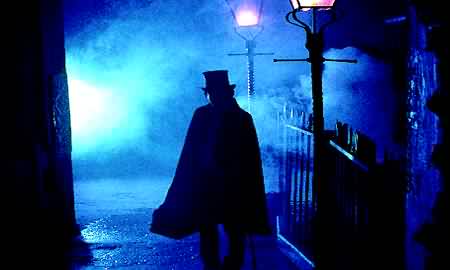There is a video game that is part of "Gary's Mod" on the Steam video game service. In that game all the players are put into an area. One person is designated "The Murderer" and the others are the "Bystanders". The Murderer has a knife and can kill the other players. Only one of the players gets a gun, which they can drop and it can be picked up by the other Bystanders. The trick is for the Murderer to isolate the players and kill them without alerting the one with the gun. There is no way for anyone to be able to tell who is a Bystander and who is a Murderer aside from what they say and do.
I have come up with a sort of table top game based on this. I did a little Google searching and did not find anyone that had done this already, but it seems like such a no-brainer that I'm sure I am not the first to do it, so I claim no right of "first".
A Game of Notes
 What you will need is some form of hat or bucket and several pieces of paper. The game is separated into Rounds and Turns. You begin a round by writing "Knife" on one piece of paper, "Gun" on another piece of paper, and "Bystander" on all the others. You put these in the container and the players draw them. Until all the players have had a chance to take a piece of paper, no words are spoken. After the last piece of paper is drawn the players are free to say what they will. They can declare they are bystanders, they can even declare they have the gun, it would probably be unwise to claim to have the knife.
What you will need is some form of hat or bucket and several pieces of paper. The game is separated into Rounds and Turns. You begin a round by writing "Knife" on one piece of paper, "Gun" on another piece of paper, and "Bystander" on all the others. You put these in the container and the players draw them. Until all the players have had a chance to take a piece of paper, no words are spoken. After the last piece of paper is drawn the players are free to say what they will. They can declare they are bystanders, they can even declare they have the gun, it would probably be unwise to claim to have the knife.Playing a Round
The players begin the round by each getting a turn to make a case for their innocence. They may not show their piece of paper at all, unless the person with the gun wishes to use it as proof they are not the Murderer. The choice to show the gun is up to the player, if they wish, they may hide the fact that they have the gun.
After each person has had the chance to defend/declare themselves, new paper is passed around to the players that is blank. If the player is a Bystander(even if they have the gun), all they can write down on this paper is Innocent. No one is yet to share what they write down. The player with the Knife may also write down Innocent, or they may write down the name of a non-Gun holding player they wish to kill. All the papers are folded and put into a container. Before the papers are revealed, the person with the gun may reveal they have the gun and kill a player using it. This is the only way to pre-preemptively stop a murder from happening and can only be done once per round. They can also just wait and see what happens if they wish, and not kill anyone. After the first piece of paper is revealed, the person with the gun can no longer shoot it this round. If the Murderer tries to kill the Bystander with the gun, without anyone knowing that person has the gun, then the Murderer is shot and dies instantly losing the game.
Each piece of paper is revealed. If the Murderer has killed someone, they leave this game. If the Bystander with the gun killed someone innocent, the killed Bystander killed will profess their innocence and leaves the game. If the Bystander with the Gun kills the Murderer, the game is over. If there are Bystanders left, the game starts a new Round, repeat the steps of the Round. If only the Murderer and the Bystander with the gun is left, the Murderer kills him or her and wins the game. Repeat the rounds until either the Murderer kills the Bystander with the Gun, or the Murderer is dead.
There are some scenarios that players can do to be jackasses and ruin the fun. A point system can fix this and I've wrote down a few, but I'm not sure I want to go the points route. I think this will work good enough for some light fun. A simple, quick rule that will encourage Gun holders to fire and Murderers to murder is that for each person dead at the end of the game, the Murderer gets 1 point, for each one alive at the end of the game the Murderer gets -1 point.








